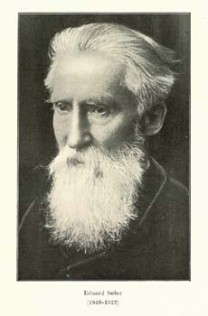Eduard Seler was born in Crossen/Oder in the Brandenburg region in 1849. From 1876 onward he worked as a secondary school teacher in Berlin, but retired from this profession due to health problems.
Eventually Seler studied Mathematics, Mineralogy, Botany and Paleontology. He graduated with a Ph D thesis on Mayan Languages in Leipzig in 1887. The same year he undertook his first research trip to Mexico, which was followed by five further journeys to this country until 1910. Accompanied and strongly supported by his wife Caecilie Seler-Sachs, he established a large collection of botanical, linguistic and archaeological material throughout these years.
In 1892 Seler became assistant of the head chairman of the Ethnological Museum (formerly: Staatliches Museum für Völkerkunde) in Berlin. Two years later he completed his habilitation thesis on Mexican Pictoral Manuscripts and began lecturing.
In 1899 Seler took up a professorship for American Languages, Anthropoloy and Antiquity Studies. He furthermore became head of the Department for America at the Berlin Ethnological Museum (formerly: Staatliches Museum für Völkerkunde) in 1903. In 1910/11 Seler also chaired the International Archaeological Institute in Mexico.
In 1919 Seler became honorary member of the Berlin Society of Anthropology, Ethnology and Early History (Berliner Gesellschaft für Anthropologie, Ethnologie und Urgeschichte, BGAEU). He died in Berlin three years later.
Seler was among the first to dedicate his scientific life to the research on ethnographical, historical and religious aspects of both Ancient American and Mesoamerican cultures. He can thus be regarded as one of the most influential founding figures of this discipline in the early 20th century.
(Text written by Vincenz Kokot in July 2012, based on German and English articles at wikipedia.org; photo source: http://research.amnh.org/anthropology/f/mexhall_11_f.jpg)
Short Portrait: Eduard Seler

Eduard Seler
 further information
further information

